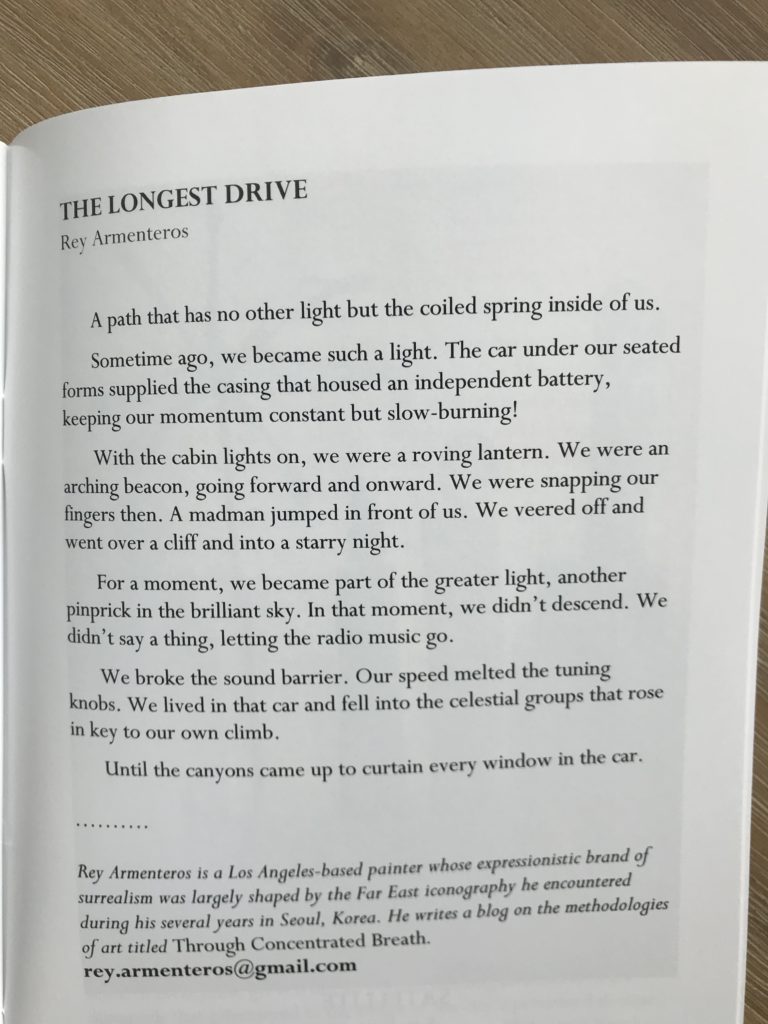17 July 2020
by Rey Armenteros
Charles Simic was the one I wanted to become my favorite poet. But I couldn’t for reasons I can’t get into. But then, the question would be who could be a valid candidate for a favorite poet?
This was not the thing on my mind when someone went up to my seven-year-old daughter and asked her about the book by Italo Calvino I had left on the table. I was witnessing this in my periphery because I was busy filling out a form. I could see my daughter pointing at me, and the lady approaching me. Point blank, she asked me if I was reading Italo Calvino. It’s not a question you normally get asked. I looked up from the form and thought about it. Italo Calvino didn’t just show up on that table one day. There was a progression to this. I started my answer by mentioning my quest for prose poetry. I brought up the first anthology of prose poems I had read. Then I said that led me to other anthology books. I kept taking looks over at the book where my daughter had already picked up her name badge, as if the book were the object that represented the accolades at the end of such a journey. I was conscious that my daughter’s dance recital was about to start, and I really had to finish this form.
The whole time I was explaining the book, the lady was nodding her head because she knew Calvino, and as a literature teacher, she was expressing amazement that anyone would even bother, practically praising me for doing such a thing.
Still conscious of the one or two minutes left to me, I continued. I didn’t know who I was talking to, but I thought it was prudent of me to bring up the third prose poetry anthology from which Calvino’s selection came, where I first encountered his work. I had known his name before, but it was thanks to this anthology that I could place a voice to the face. Six poems from his Invisible Cities were in the anthology, and the lady let me know she was aware of this book too. My daughter was waiting for me to finish filling out the form so that we could go in already because her audition was about to start. I was juggling all this in my head, simultaneously thinking about my address and other contact information for the form. Undeterred, I was plumbing through the recollected steps of my poetic journey, mesmerized by how I was answering about information I had always thought about but had never voiced. But then, she asked me who my favorite poet was, and I was nonplussed. I had no answer.
At that moment, one of the dance school teachers came out and told me it was time! Once I got inside, there was no time for poetry, and I had lost track of the lady.
She was obviously one of the mothers at the dance studio, but I had never seen her before. Even so, after our conversation, I was confident I’d see her again to continue this fascinating topic. In preparation for the second part to our conversation, I thought about her question, because it only made sense that you would have a favorite poet. I read Charles Simic the most, and I thought he was the natural answer. The problem was that the more I read him, the more I discovered we were not in step to the same rhythm. I was a different kind of reader than the type he was writing to, I thought. The more I read him, the more it seemed obvious he was not writing to anyone, actually.
Calvino could have been a contender. If on a Winter’s Night a Traveler was the book the lady had found on the table, and I recall telling her that it was getting borderline annoying. I enjoyed the premise of the book, but the problem I had with it was also tied to the premise. The book was about how a reader (a generic reader who becomes an actual character in the book) starts reading a book but then, for various ludicrous reasons, cannot finish it as he starts the beginnings of other books. It was annoying in the manner that Calvino kept finding another outlandish reason why the next book and the next book could not be finished either. As it turned out, regardless of my annoyance, I finished that book a few days after the audition, and I found it was so well-written, that I pardoned this small slip and ended up loving the book as a clever piece of reasoning. But I probably would not include Calvino as a favorite poet because very little of what I have read of his can be classified as poetry.
I was stumped because I had no actual poet to point to and say that that person was my ideal creator. Even though as an artist, I don’t have a favorite painter, I was convinced I needed to have an answer ready for the next time I encounter the lady.
There was another angle to this. Having this brief dialogue with the lady at the audition reminded me that I needed to interact more with my fellow writers. I wanted to become a member of some writing club that knew about luminaries like Simic and Calvino. Having a literary instructor in the dance studio meant connections. The next opportunity for a casual conversation, I was going to ask her if she knew of any literary or poertry group.
That was when it occurred to me that I couldn’t recall what the lady looked like. Every time I went to the dance studio after that, I was very aware of the possibility that I could be walking right past her without saying a thing. She never approached me again, and I wondered if it were because she thought I was snubbing her.
My plans for belonging to a writing society were fizzling. Then, a few weeks after the audition, we got quarantined with the pandemic. It was fate, as I was starting to read it in the cards. At home now with plenty of time to read and assess, I can go back to the question of who is my favorite poet, and I have yet to come up with anything. I go back to Charles Simic and read and read the same poems to see if I still have a chance of fitting him into this ideal. It has to be in there somewhere.
Leave a comment |
Categories: Ancedote, Essay, Poetry, ReyA', Writing Process
|
Tags: anecdote, essay, poetry, writing process

